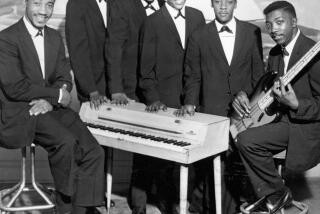Fiddler Williams, 96; Jazz Violinist and Guitarist Was Part of Kansas City Scene
- Share via
Claude “Fiddler” Williams, a jazz violinist who was part of Kansas City’s thriving music scene during the swing era of the 1930s and enjoyed newfound popularity in his later years, died Sunday. He was 96.
Williams, who also played guitar, mandolin and bass during his prime, died at Research Medical Center in Kansas City, the Kansas City Star reported. His wife, Blanche, said he had been hospitalized there with pneumonia since April 5.
Born in Muskogee, Okla., Williams worked in his home state with a band led by bassist Oscar Pettiford.
He moved to Kansas City in 1928 and joined Terrence Holder’s band, and remained with it after it became 12 Clouds of Joy under the leadership of Andy Kirk.
He played later with a band led by Alphonso Trent, which Williams said was “the first black big band allowed to play at white clubs in Oklahoma,” and later in Chicago with Nat King Cole and his brother Eddie Cole, a double bass player.
After hearing him play in Chicago, Count Basie hired Williams to play guitar and violin with his band. But when Basie moved his band to New York, Freddie Green replaced Williams as the guitarist.
Williams worked in relative obscurity over the next three decades. He played with various Kansas City bands until moving in 1940 to Michigan with George Lee, another Kansas City musician.
“We put together a band of the common laborers there,” Williams said. “It finally broke up when several of the boys had to go into the service.”
Williams worked as a welder by day and musician at night, coming back to Kansas City in 1952.
A recording on which he played violin and guitar with pianist Jay McShann’s band in 1972 revived his career. He continued to tour with McShann throughout the 1970s and appeared as a soloist at jazz festivals in the 1980s.
In 1988 he was featured in the Broadway revue “Black and Blue,” focusing new attention on his skills, and in the early 1990s he was inducted into the Oklahoma Music Hall of Fame. He became a popular attraction at nightclubs and music festivals around the country and overseas.
More to Read
The biggest entertainment stories
Get our big stories about Hollywood, film, television, music, arts, culture and more right in your inbox as soon as they publish.
You may occasionally receive promotional content from the Los Angeles Times.









